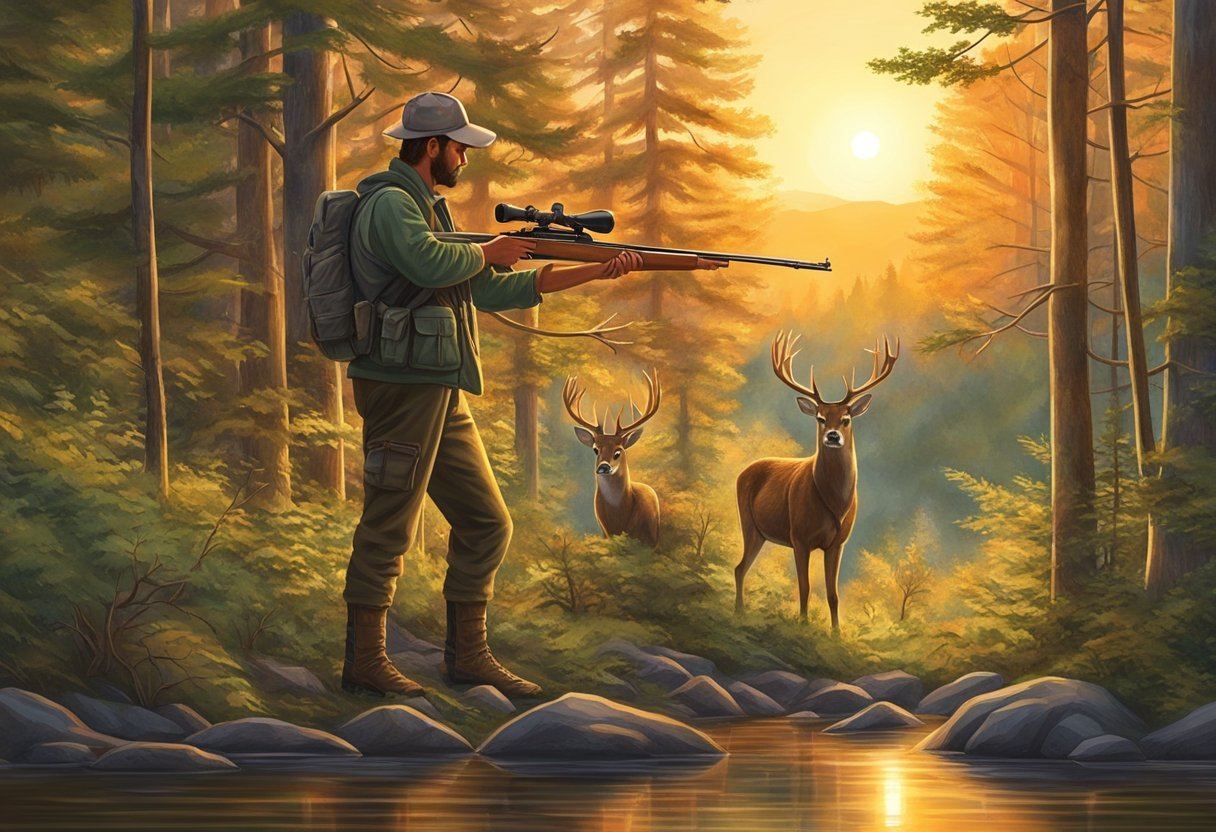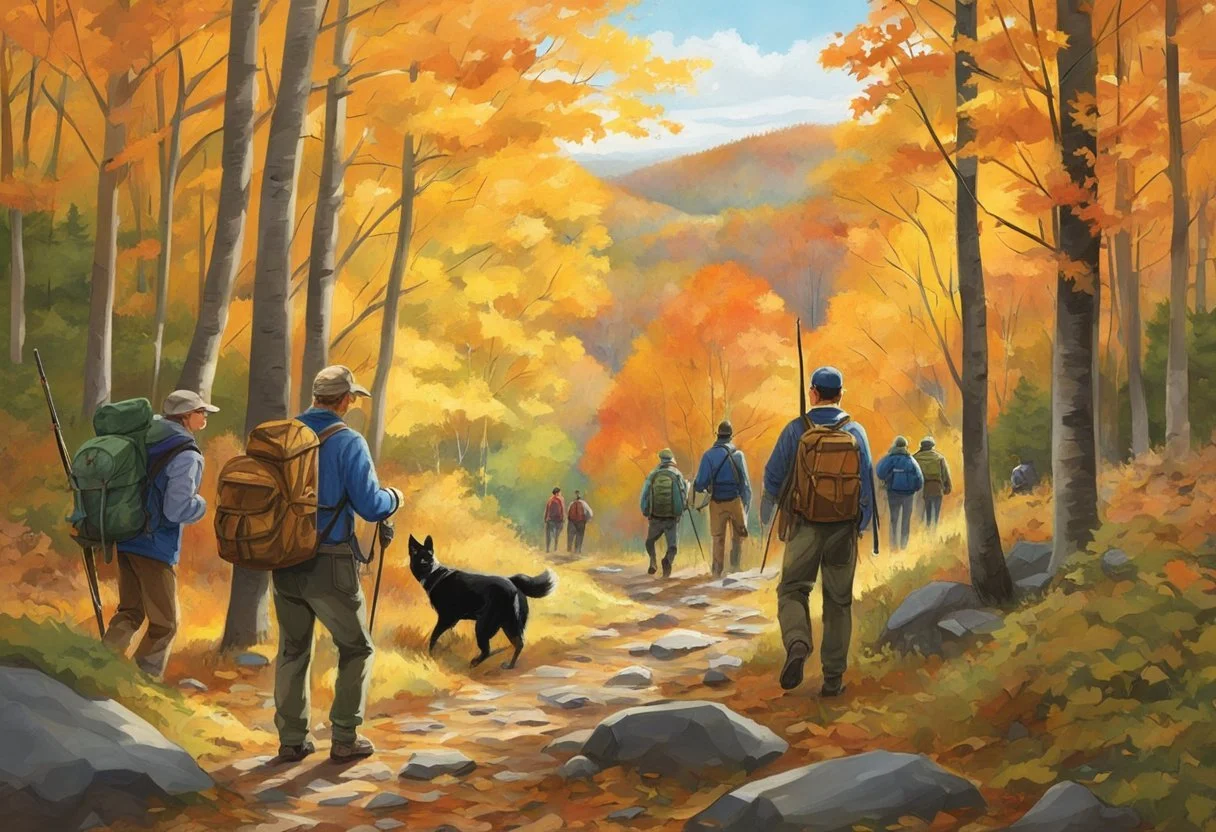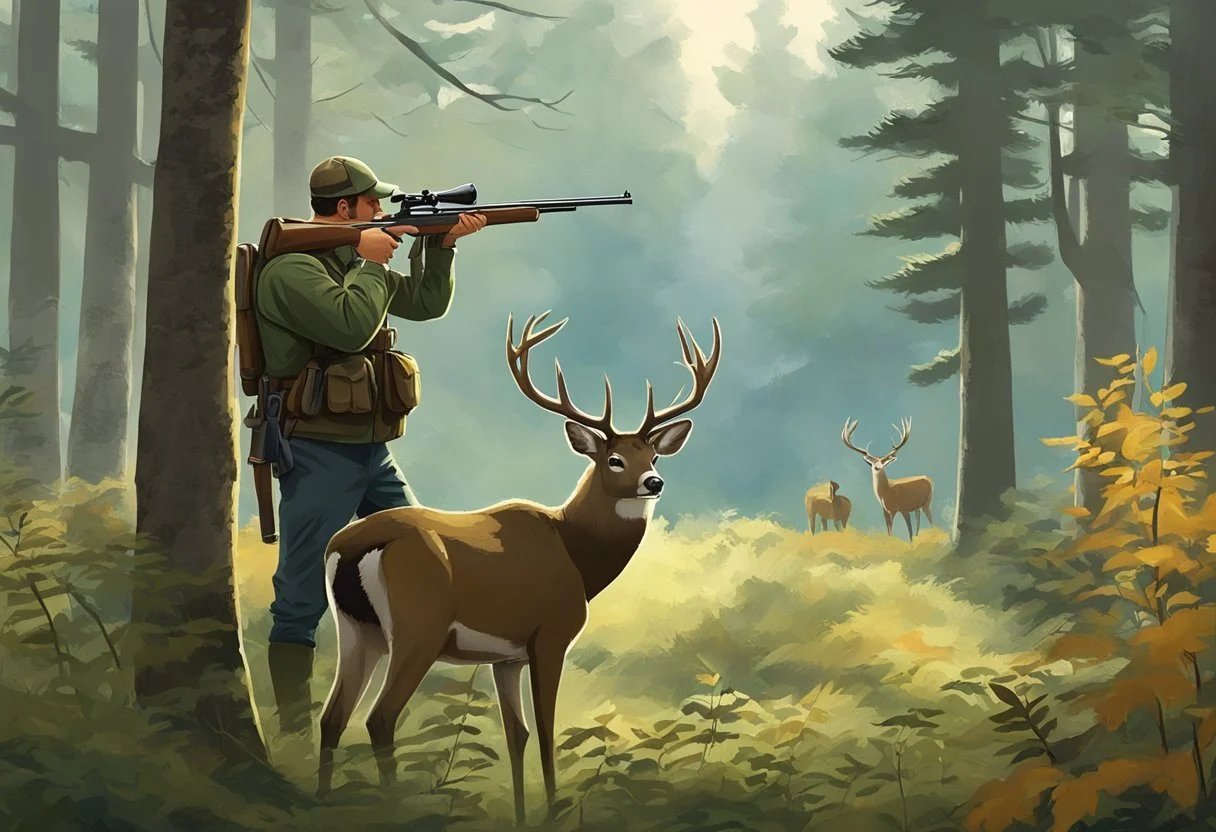Your Guide to Hunting in Vermont
Essential Tips and Tricks
This Article is Part of Our Hunting Guide for All 50 US-States
Hunting in Vermont offers a unique and rewarding experience for beginners looking to immerse themselves in nature and participate in a time-honored tradition. Located in the northeastern United States, Vermont boasts diverse landscapes, from dense forests to serene lakes, providing an ideal setting for various hunting pursuits. As a beginner, understanding the basics of hunting in the Green Mountain State is crucial for both safety and success.
To get started, it is essential to familiarize yourself with Vermont's hunting regulations and seasonal information, administered by the Vermont Fish and Wildlife Department. These guidelines outline the legal hunting seasons, bag limits, and specific rules for various species, such as deer, bears, turkeys, and waterfowl. Obtaining a hunting license, completing a hunter education course, and procuring necessary gear are also critical steps in preparation for a fulfilling experience in Vermont's great outdoors.
In addition to understanding the legal aspects of hunting, it's important for beginners to learn about the numerous tactics and methods employed by seasoned hunters in Vermont. Local hunting clubs or experienced hunting mentors can provide valuable insights and guidance for a successful first hunting experience. By forming connections within Vermont's hunting community and continuing to develop essential skills, beginners will soon discover the rich and rewarding tradition of hunting in this beautiful state.
Understanding Hunting Regulations
License Requirements
In Vermont, all hunters are required to obtain a valid hunting license before engaging in any hunting activities. The Vermont Fish and Wildlife Department offers various types of licenses catering to residents, non-residents, youth, and senior citizens. It is crucial for aspiring hunters to pick the appropriate license according to their needs and eligibility. Licenses can be purchased online or at authorized license agents across the state.
Resident License: For individuals who have lived in Vermont for at least 6 months.
Non-resident License: For individuals visiting Vermont for hunting purposes.
Youth License: For hunters aged 15 or younger.
Senior License: For hunters aged 65 or older.
Open Seasons and Game Laws
Vermont has specific open seasons for different game species, ensuring a sustainable hunting experience and preserving the ecosystem. Familiarity with these seasons is crucial for new hunters. You can find the information on open seasons and bag limits on the Vermont Fish and Wildlife Department's official website.
Some common game species and their respective hunting seasons in Vermont are:
Game Species Open Season White-tailed Deer Archery, Muzzleloader, Rifle Black Bear Early and Late Seasons Wild Turkey Spring and Fall Seasons Small Game Various seasons throughout the year
It is essential to understand and comply with the various game laws in Vermont (bag limits, legal hunting hours, methods, and equipment). Violation of these regulations can result in penalties, including fines, license revocation, or legal action.
Safety Education and Training
Vermont hunters are required to complete a Hunter Safety Education Course before obtaining their first hunting license. This education requirement applies to all first-time hunters, regardless of their age. The course covers topics such as firearm safety, hunting ethics, wildlife identification, and conservation practices. Safety education courses are offered by the Vermont Fish and Wildlife Department and can be completed online or through an in-person class.
In addition to the basic safety course, Vermont also offers a Bowhunter Education Course for archery hunters and a Trapper Education Course for those interested in trapping. These courses are designed to provide hunters with the necessary skills and knowledge to hunt safely and responsibly while respecting the environment and wildlife.
Prepare for the Hunt
Choosing the Right Gear
Before embarking on a hunting adventure in Vermont, ensuring you have the right gear is essential. Start by selecting a weapon appropriate for the game you will be targeting, such as a rifle, shotgun, or bow. Additionally, invest in a quality pair of binoculars and a range finder for accurate distance measurements. Don't forget essential safety items such as a compass, a GPS device, and a first aid kit for emergencies.
Here's a list of basic gear to consider:
Weapon (rifle, shotgun, or bow)
Ammunition or arrows
Binoculars
Range finder
Compass
GPS device
First aid kit
Clothing and Camouflage
In addition to the right gear, proper clothing and camouflage are crucial for a successful hunt. Select clothing that is appropriate for the predicted weather conditions and terrain. Layering is the key to tackling varied temperatures throughout the day. A base layer should wick moisture from the body, a mid-layer provides insulation, and an outer layer should be waterproof and breathable.
Camouflage plays a significant role in hunting, enabling you to blend into the environment and remain undetected by game. Choose camo patterns that match the colors and patterns of Vermont's terrain.
Hunting Tactics and Tracking
To increase the likelihood of a successful hunt, familiarize yourself with various hunting tactics and tracking techniques. Scouting the hunting area beforehand helps to identify game trails, feeding and bedding areas, and other signs of wildlife. Take advantage of natural barriers, such as terrain features and wind, to move stealthily while approaching your target.
Learn the art of tracking by studying tracks, droppings, and other signs left by the game. Research the animals' habits, and practice identifying sounds and patterns that could give away their presence. Patience and persistence are crucial for hunters to outwit their prey.
In summary, preparing for a hunt in Vermont encompasses choosing the right gear, dressing appropriately, and mastering essential hunting and tracking skills. These elements will contribute to a safer and more enjoyable hunting experience.
Species and Habitats
Deer Hunting
Vermont is home to an abundant population of white-tailed deer. These animals can be found in various habitats across the state, including hardwood forests, mixed woodlands, and even agricultural fields near forested areas. Deer prefer to reside in areas with thick brush and vegetation for cover and bedding. Hunting white-tailed deer is a popular activity for beginners due to the relatively large deer population and a wide range of available hunting methods, such as still hunting, stand hunting, and driving.
Small Game Pursuits
Several small game animals inhabit Vermont's diverse habitats, creating numerous hunting opportunities for beginners. Some common small game species include:
Coyote: These adaptable predators can be found statewide in forests, farmlands, and even suburban areas. Coyotes are primarily nocturnal and can be hunted using calls and decoys to lure them in.
Moose: Though they are not as common as deer, moose can be found in the northern part of the state, particularly in marshy or wetland habitats. Hunting moose requires a special permit, and success rates are typically lower in comparison to other species.
Black bear: Vermont's black bear population can be found in wooded habitats, specifically in areas with accessible food sources such as berry patches and agricultural fields. Bear hunting requires specialized knowledge and skills in tracking and preparation.
Waterfowl and Turkey
Waterfowl and turkey are also popular hunting targets in Vermont. The state boasts diverse waterfowl species and habitats, including marshes, ponds, and lakes. Some common waterfowl species hunted in Vermont are:
Ducks Geese Mallard Canada Goose Wood Duck Snow Goose Green-winged Teal - Common Merganser -
Turkey populations have been steadily increasing in Vermont, particularly in mixed hardwood-softwood forest habitats. Spring turkey hunting is a popular pursuit, with a focus on locating vocal gobblers using calls and decoys to attract the birds within shooting range.
In conclusion, Vermont offers a varied and rich assortment of species and habitats for beginner hunters to explore. The state's diverse landscape supports a wide range of game animals, ensuring a rewarding and educational hunting experience.
Hunting Areas in Vermont
Private and Public Land Regulations
In Vermont, hunting is permitted on both private and public lands. However, it is important to know the regulations for each type of land. For private land, it is necessary to obtain permission from the landowner before hunting. It is strongly recommended that hunters secure written permission to avoid misunderstandings and maintain a positive relationship with landowners.
On the other hand, public land such as the Green Mountain National Forest and state lands are open to hunting without the need for landowner permission. That said, specific regulations do still apply in these areas, and hunters should familiarize themselves with the rules before venturing out.
Some important public lands for hunting in Vermont include:
Green Mountain National Forest
Silvio O. Conte National Fish and Wildlife Refuge
Missisquoi National Wildlife Refuge
State-owned Wildlife Management Areas
Popular Hunting Grounds
Vermont offers numerous opportunities for hunters to explore its diverse landscape. Some popular hunting grounds include:
Green Mountain National Forest: Encompassing over 400,000 acres, this forest offers a vast wilderness for hunting an array of game species such as white-tailed deer, black bear, wild turkey, and more.
Silvio O. Conte National Fish and Wildlife Refuge: Spread across four states, including a portion in Vermont, this refuge provides a variety of habitats to support waterfowl and other game species. Hunting for wild turkey, white-tailed deer, and ruffed grouse is permitted in the refuge.
Missisquoi National Wildlife Refuge: Located on the eastern shore of Lake Champlain, this refuge offers limited hunting opportunities for waterfowl and white-tailed deer.
State-owned Wildlife Management Areas (WMAs): Vermont's Wildlife Management Areas offer a mix of open land, wetlands, and forests for hunting. With over 80 WMAs scattered across the state, hunters have access to land specifically managed to support healthy game populations.
In summary, Vermont provides a rich variety of hunting opportunities on both private and public lands. By understanding the different land regulations and popular hunting grounds, beginner hunters can make informed decisions and have a successful, enjoyable experience in Vermont's beautiful outdoors.
Ethical Hunting Practices
Respect for Wildlife
Ethical hunting practices require a deep respect for wildlife and their habitats, understanding their needs and behaviors. This respect entails adhering to the established hunting regulations, such as observing season start/end dates, and the proper use of hunting equipment. To maintain the ecosystem balance, hunters should be knowledgeable about the species they're targeting and practice selective harvest, focusing on the appropriate age and sex of the animal.
It's vital to strive for a quick, humane kill, avoiding unnecessary suffering for the animal. This requires practicing your marksmanship and understanding the anatomy of your prey to ensure a swift, well-placed shot. Additionally, responsible hunters should never engage in wasteful practices and utilize as much of their harvested game as possible.
Landowner Engagement
Building positive relationships with private landowners is essential to ethical hunting practices. Gaining permission to hunt on someone else's property is a critical step, showing your commitment to respecting their land and preserving their goodwill.
When granted permission, always abide by any specific guidelines or rules established by the landowner to show your gratitude for their generosity. This includes:
Closing gates to prevent livestock from wandering
Picking up litter and leaving the area in a clean state
Reporting any damage or fencing issues immediately
Also, consider offering a helping hand to landowners for maintaining the property and engaging in conservation practices. By building strong connections with landowners, hunters can help preserve the tradition of hunting and maintain access to the land for future generations. Remember, fostering a positive relationship with the landowner is not just an ethical responsibility but also a way to protect the hunting community's reputation and future privileges.
After the Hunt
Field Dressing and Meat Preparation
Once a beginner hunter in Vermont has successfully harvested their game, it's important to promptly field dress the animal. Field dressing involves removing the internal organs to ensure the meat stays fresh and uncontaminated. Remember to always carry a sharp hunting knife, gloves, and a rope or cord to assist with the task.
First, lay the animal on its back and use the legs as support.
Make an incision from the sternum down to the anus, being careful not to puncture the intestines.
Remove the entrails, taking extra care when removing organs near the anus, as a rupture may damage the meat quality.
Rinse the cavity with clean water to remove any remaining debris, and prop open to allow air-drying.
Meat preparation is essential for optimal taste and safety. Depending on the size of the game, the best approach to butchering will vary. For example, smaller animals like rabbits can be skinned, while larger game like deer should be hung to improve tenderness.
Animal Size Butchering Process Small Skinning Large Hanging
While preparing the game, be sure to keep a clean workspace and trim away any bruised or damaged meat. Store the prepared meat in airtight packaging and use proper refrigeration to preserve its freshness.
Trophy Management
For many hunters, taking home a trophy buck is just as important as the meat itself. To preserve the integrity of the antlers and other trophy parts, follow these guidelines:
Clean and preserve antlers: Treat the antlers with oils and waxes to retain their natural luster. Use a soft brush to remove dust and debris.
Proper storage: Store trophy parts in a cool, dry place away from direct sunlight to avoid discoloration and damage.
If you choose to mount your trophy buck, several professional taxidermy options are available. It's essential to choose a reputable and experienced taxidermist, as improper techniques can result in an undesirable appearance.
Remember, hunting in Vermont for beginners can be both enjoyable and fulfilling. Practicing proper care and responsibility after the hunt will ensure a successful and memorable experience.
Beyond the Basics
Advanced Techniques
For experienced hunters looking to up their game, mastering advanced techniques is vital. One strategy is to perfect your calling techniques. Different game species require unique vocalizations, and understanding how to mimic these can greatly increase your chances of success. Invest time in practicing distress calls, mating calls, and other communication sounds to draw in your desired animals.
Another advanced technique to consider is scouting. Frequent scouting trips will help you become familiar with the area, animal habits, and preferred habitats. This knowledge will enable you to identify prime hunting locations and predict the movements of animals during different seasons.
Yet another advanced skill is trapping. Even though trapping is often associated with hunting for fur-bearing animals, it can also be useful for those wishing to hone their hunting skills. Learning how to set and check traps properly can be an exciting and rewarding addition to your hunting adventures.
Community and Further Learning
Participating in the hunting community is equally important for growth as a hunter. Engaging with fellow hunters through social media, online forums, or local clubs allows for the exchange of invaluable insights and tips. Additionally, hunters can also learn more about the latest equipment and innovative techniques within the community.
Continuing your hunting education is essential to becoming a more versatile and capable hunter in Vermont. Many experienced hunters still pursue courses, workshops, and seminars to further develop their skills, as learning should be a constant process throughout your hunting journey.
In conclusion, going beyond the basics by mastering advanced techniques, scouting, trapping, and staying up-to-date with the community's developments can transform you into a more knowledgeable and confident hunter. Embrace the sense of recreation and adventure as you continue your journey in the beautiful forests of Vermont.




